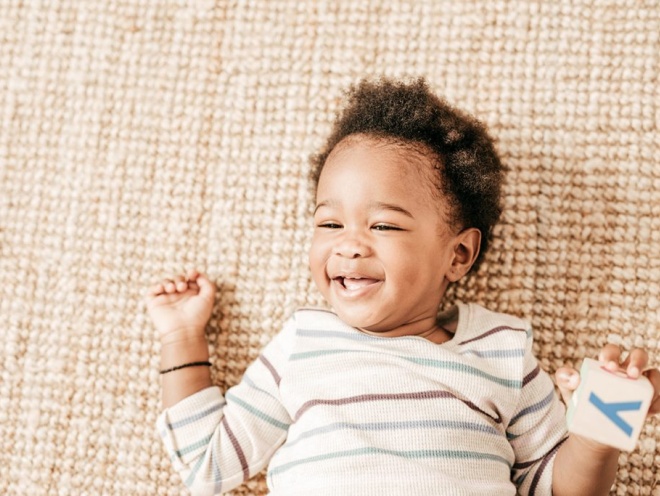Once your toddler has the hang of daytime potty training, they will need to master the art of dry nights. Here we talk about night-time potty training.
It can take months or even years for some children to achieve night-time potty training success (ERIC, 2010). So don’t feel you must rush it.
It’s good to focus first on getting your little one reliably potty trained during the day (NHS Choices, 2018). Then you can start night-time potty training.
It usually takes longer for children to get the hang of potty training at night. Once you are confident your child is ready for it, you can take steps to help them stay dry at night.
All children develop at a different pace but to give you a rough idea:
- By age three years, nine out of ten children are dry most days. Even if your little one is potty trained they might still have occasional accidents. All children get this, especially if they're excited, upset or absorbed in something.
- By age four years, most children are reliably dry in the day. It’s normal for night-time potty training to take longer. Most children learn how to stay dry at night when they are between three and five years old.
Up to one in five children aged five years sometimes wet the bed. (NHS Choices, 2018)
When to start potty training at night
- The best time to start night-time potty training is when your little one is showing signs they are ready for it. Each child is different but it’s normal for them to learn to stay dry at night a little while after daytime potty training.
- To be able to potty train at night, your child needs to be physically ready and want to do it. If your child’s nappy is dry or only slightly damp for a few mornings in a row, it could be a good time to try potty training at night. (NHS Choices, 2018)
Signs of readiness for night-time potty training
If one or more of the following signs are present it might be a good time to try night-time potty training.
- Your child’s nappy or night-time pull-up pants are dry or only slightly damp in the morning.
- They refuse or ask not to wear their nappy or pull-up pants at night.
- Your little one removes their nappy or pull-up pants during the night.
- They wake in the night and ask for help to use the potty or toilet, or go by themselves.
- Your child’s nappy or pull-up pants might be dry for two or three nights in a row. (ERIC, 2010; NHS Choices, 2018)
How to start potty training at night
Fitting a waterproof mattress protector under your child’s bed sheet is a good idea. Although some parents prefer not to do this or add extra sheets instead.
- It can help to have a spare set of bedding and pyjamas near just in case your little one has an accident in the night. Accidents can be expected in the beginning, it’s important to be calm and reassuring when they do.
- Place a potty nearby so your little one can use it in the night if they need to.
- Talk to your child about night-time potty training. Tell them how grown up they are and how they will need to use the potty or toilet at night if they need to go. Reassure them they can ask for help if they need it.
- Always ask your child to use the potty or toilet last thing before bed as part of their bedtime routine. It’s a good idea to ask them first thing in the morning too.
- Just like with daytime potty training, make sure you praise your child for their successes (ERIC, 2010; NHS Choices, 2018).
Night-time potty training is a major milestone for your little one. It can take time to master. If you start potty training at night and things aren't going well, use nappies or pull-up pants at night for a while longer (ERIC, 2010). You can try again in a few weeks' time.
This page was last reviewed in March 2018
Further information
Our support line offers practical and emotional support with feeding your baby and general enquiries for parents, members and volunteers: 0300 330 0700.
You might find attending one of our NCT New Baby courses helpful as they give you the opportunity to explore different approaches to important parenting issues with a qualified group leader and other new parents in your area.
Make friends with other parents-to-be and new parents in your local area for support and friendship by seeing what NCT activities are happening nearby.
NHS Choices has more information on potty training.
ERIC. (2010) Potty training. Education and resources for improving childhood continence. Available from: www.eric.org.uk [Accessed 1st June 2018]
NHS Choices. (2015) How To Potty Train. Available from: https://www.nhs.uk/conditions/pregnancy-and-baby/potty-training-tips/ [Accessed 1st June 2018]
Further reading
Brazleton T, Christopherson E, Frauman A, Gorski P, Poole J, Stadtler A, Wright C. (1999) Instruction, timeliness and medical influences affecting toilet training. Paediatrics. 103:1353-1358. Available from: http://pediatrics.aappublications.org/content/103/Supplement_3/1353 [Accessed 1st June 2018]
Buckley S. (2002) Mothering, mindfulness and a baby’s bottom. An introduction to elimination communication. Mother. Issue 3. Available from: https://sarahbuckley.com/mothering-mindfulness-and-a-babys-bottom-an-in… [Accessed 1st June 2018]
Hatch, A. (2017) What is baby-led potty training? Available from: http://amberhatch.com/what-is-baby-led-potty-training/ [Accessed 1st June 2018]
Institute of Health Visiting. (2014) IHV Parent tips. Available from: https://ihv.org.uk/for-health-visitors/resources-for-members/resource/i… [Accessed 1st June 2018]





